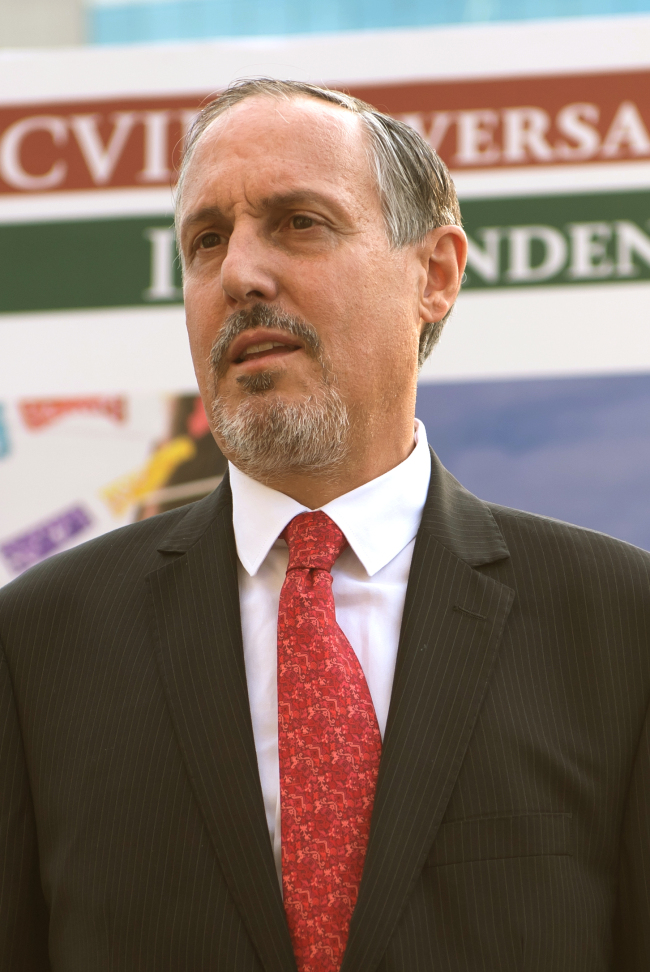The recent expulsion of the North Korean ambassador from Mexico was a fitting expression of disavowing Pyongyang’s defiance of international norms and principles, said Mexico’s top envoy to Korea, stressing his country is ready to muster action behind the talk of denuclearization.
Leading the international coalition against North Korea’s nuclear and missile program, the Foreign Ministry of Mexico declared former North Korean Ambassador to the country, Kim Hyong-gil, “persona non grata” on Sept. 7, and ordered his leave within a short time period.
Kim left the country on Sept. 14, but Mexico still maintains diplomatic relations with North Korea with the communist nation’s embassy continuing its operation in Mexico City on the level of charge d’affaires.
“Our decision to expel the North Korean ambassador was hardly a surprise,” Mexican Ambassador to Korea Bruno Figueroa told The Korea Herald in an interview. “Our government had vehemently condemned North Korea’s nuclear and missile tests and threats that undermine the international security. Expelling a foreign ambassador is a strong measure, but it was done precisely to make our case clear that North Korea’s provocations go against the grain of our foreign policy promoting global peace and security.”
In countering Pyongyang’s escalating brinksmanship, the United Nations Security Council adopted resolutions 2371 and 2375 on Aug. 5 and Sept. 11, respectively, restricting the purchase of North Korea’s main export items -- coal, iron, lead and seafood -- as well as cutting off over 55 percent of refined petroleum products flowing into the cash-strapped nation. Mexico, for its part, issued an executive order instructing all government agencies to fully comply with the UNSC resolutions, Figueroa said.
Leading the international coalition against North Korea’s nuclear and missile program, the Foreign Ministry of Mexico declared former North Korean Ambassador to the country, Kim Hyong-gil, “persona non grata” on Sept. 7, and ordered his leave within a short time period.
Kim left the country on Sept. 14, but Mexico still maintains diplomatic relations with North Korea with the communist nation’s embassy continuing its operation in Mexico City on the level of charge d’affaires.
“Our decision to expel the North Korean ambassador was hardly a surprise,” Mexican Ambassador to Korea Bruno Figueroa told The Korea Herald in an interview. “Our government had vehemently condemned North Korea’s nuclear and missile tests and threats that undermine the international security. Expelling a foreign ambassador is a strong measure, but it was done precisely to make our case clear that North Korea’s provocations go against the grain of our foreign policy promoting global peace and security.”
In countering Pyongyang’s escalating brinksmanship, the United Nations Security Council adopted resolutions 2371 and 2375 on Aug. 5 and Sept. 11, respectively, restricting the purchase of North Korea’s main export items -- coal, iron, lead and seafood -- as well as cutting off over 55 percent of refined petroleum products flowing into the cash-strapped nation. Mexico, for its part, issued an executive order instructing all government agencies to fully comply with the UNSC resolutions, Figueroa said.

In the beginning of this year the North Korea Embassy in Mexico was already required to reduce its diplomatic staff, while in 2014, the North Korean freighter ship “Mu Du Bong” -- whose owner was listed among those subject to sanctions -- was seized by Mexican authorities in the port of Tuxpan, Veracruz, upon request by the UNSC.
“For the last 55 years, Mexico has relentlessly promoted denuclearization and disarmament, having successfully negotiated the denuclearization of Latin America through the Treaty for the Prohibition of Nuclear Weapons in Latin America and the Caribbean -- conveniently called the ‘Tlatelolco Treaty’ and named after the location of our foreign ministry,” the diplomat underlined.
The treaty, the first of its kind encompassing an entire continent, symbolized the region’s unified rejection of the idea that nuclear weapons can guarantee peace and security, he explicated. The Agency for the Prohibition of Nuclear Weapons in Latin America and the Caribbean, based in Mexico City, was established by the treaty to monitor its implementation, serving as a platform for exchanging information and spurring consultation between regional countries and those outside as part of nuclear-weapon-free zones.
Pointing out that Mexico’s former foreign minister Alfonso Garcia Robles (from 1975-76) received the Nobel Peace Prize in 1982 for his work through the Conference for Disarmament in Geneva, Figueroa said his country remains resolutely opposed to any threats to the international security, which invariably affect Mexico, a Latin American economy with deepening ties to Asia.
“Especially our ties with South Korea are growing stronger. We share common views through the United Nations, G-20, Asia-Pacific Economic Cooperation. We also belong to a group of like-minded middle powers, MIKTA, along with Indonesia, Turkey and Australia, where we strive to play a constructive role in international affairs and promote global good governance.”
On Sept. 5, MIKTA foreign ministers jointly expressed their concerns over North Korea’s sixth nuclear test on Sept. 3, he said. The ministers called the test “a grave and serious challenge to peace and security on the Korean Peninsula and of the international community and undermining the rules-based international order.”
The Mexican diplomatic mission in Seoul is monitoring the peninsular situation closely through its defense and naval attaches, according to the embassy. High-level military visits occur regularly throughout the year, and academic exchanges also take place, with several Mexican naval officials studying at the Korean Naval Academy.
By Joel Lee (joel@heraldcorp.com)




![[Herald Interview] 'Amid aging population, Korea to invite more young professionals from overseas'](http://res.heraldm.com/phpwas/restmb_idxmake.php?idx=644&simg=/content/image/2024/04/24/20240424050844_0.jpg&u=20240424200058)












![[KH Explains] Korean shipbuilding stocks rally: Real growth or bubble?](http://res.heraldm.com/phpwas/restmb_idxmake.php?idx=652&simg=/content/image/2024/04/25/20240425050656_0.jpg&u=)

